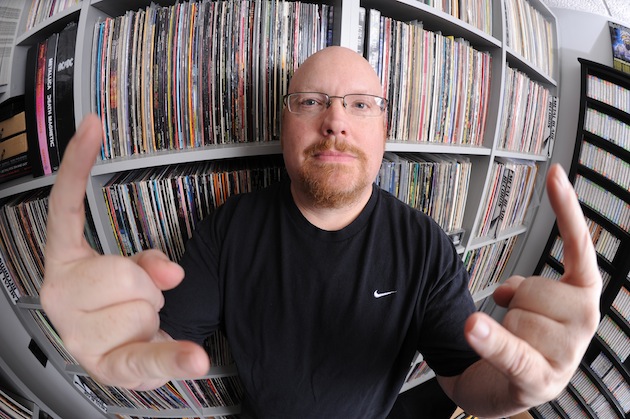Metal Blade Records: An Oral History as told by its founders and bands
by Tyler Munro
September 26, 2012
This article originally appeared in the September issue of AUX Magazine. Download and subscribe for free in the App Store.
In 1982, Metal Blade Records founder Brian Slagel was working in an LA record store. He was importing albums and writing the country’s first heavy metal zine when he got the idea to put together a compilation of local acts. The Metal Massacre series was born.
“There was starting to be this kind of scene in LA where there were some decent LA heavy metal bands, which there never used to be,” he tells AUX. “And back then, nobody knew these bands existed.”
Some of those bands included Cirith Ungol, Ratt, Bitch, and a little band called Metallica.
“I talked to the distributor that I knew from working at the record store and said, ‘If I put this together, would you guys do it?’ After a while they said yes, and that’s where this started.”
As told by:
Brian Slagel: CEO and Founder of Metal Blade Records
Bill Metoyer: VP of Metal Blade Records, 1983-1987/producer and engineer
Dave Brockie (Oderus Urungus): Gwar lead vocalist
Mike Faley: Metal Blade Records President
Paul Mazurkiewicz: Cannibal Corpse drummer

Brian Slagel, CEO and Founder of Metal Blade Records
Brian Slagel: I was doing it out of my mom’s garage. Back then, I did everything: the manufacturing, the advertising, the artwork. You name it, I was doing it. It was a one-man show for about the first three years of the existence of the label. Then, slowly but surely, I started hiring some people. The first employee was a guy named Bill Metoyer, who actually engineered a lot of the [early] records.
Bill Metoyer: I had previously worked in the warehouse of a music store called Music Plus for almost ten years. It was there that I worked with three guys that had a band called Dietrich. I would ask them to come in the studio and let me record them so I would get hands on experience as an engineer. [Dietrich’s singer] knew that Brian put out Metal Massacre. I gave [Brian] a cassette, and then a few days later he called me and told me he wanted to put one of the songs on Metal Massacre II. I reminded him that I recorded that record and told him if he had any other bands he needed recorded that I would love to do it. He said, “as a matter of fact, I know this band Armored Saint that I also want to be on the next Metal Massacre.” I started [recording] more of the bands he signed, and eventually told him that since I usually worked at the studio at night, I had days free to help out with his record label if he needed it.
BS: It started slowly get a little bit bigger and finally I was like, “I think we actually might need an office.” It was probably almost three years in when I realized that “I can’t do this all myself anymore if it’s going to keep going.”
BM: The early sessions were usually held late at night when nobody else booked the studio and I could get the time cheap. I remember mixing the Armored Saint EP while all the guys in the band were passed out on the control room floor because of something they may or may not have been smoking earlier in the session. I would occasionally say, “guys how is it sounding to you?” And a few thumbs would lift up for a second then flop back down to the sounds of snoring. Back then many of the bands like Slayer and Armored Saint were just kids.
Mike Faley, Metal Blade President, is brought in on January 27, 1987. Metal Blade’s distributor is on the verge of bankruptcy, and after losing a number of bands to major labels, Brian Slagel begins to try and align with one.
BS: We pretty much talked to everybody, but Warner was here in LA. At that point they had such a great history as an artist-oriented label so it seemed to make the most sense.
Dave Brockie: We just did America Must Be Destroyed, I guess it’s like the mid-90s. We’re getting ready to do another album, and Metal Blade is stepping up. They’re getting up with Warner Brothers, the Goo Goo Dolls are going to blow up on Warner Brothers because of Metal Blade and their support. It really seemed like the door was open there for Gwar to establish a really strong relationship with Warner Brothers.
BS: About a year and a half into our deal, they were bought by this gigantic corporate company called Time, which used to be Time Magazine, Time Inc, that became Time Warner Inc. That changed everything, because it went from being almost a mom and pop style major label to being this huge corporate entity, and that didn’t work well for what we were trying to do.
Mike Faley: When we first got involved with [Warner], it was really an artist-friendly environment. But once you have the sale of the company, you’re dealing with shareholders. You’re under the watchful eye of the corporation, of the shareholders.
BS: The first record that we gave them was a Gwar album, and they said, “No. You’ve got to take this song off. You’ve got to change the lyrics to this song.”
DB: It all came to a head over the issue of a song we had on the record called “Baby Dick Fuck,” which was just the filthiest fucking song I could think of writing. It was about having sex with a baby that was being born. The line goes, “your child is now dead and you start to blubber, fuck your warm corpse with your child as a rubber.” They told us that this whole world could potentially open for us but we’d have to take that song off the album, so I called Brian. I was like Brian, “what do we do?”
BS: I was like, “No, I’m not changing lyrics for anything.” So that was kind of the beginning of the end of that.
Paul Mazurkiewicz: We wouldn’t have wanted to change and [Brian] knew that. It’s good that Brian did what he did, that’s for sure.
BS: We knew ahead of time that [Cannibal Corpse] was a little too much for the Warner system, so we actually did that independently. Even before all the corporate stuff happened, we thought “we should probably keep this Cannibal Corpse thing underground.”
DB: Man…Brian Slagel. I call him The Elf. He looks like a barbarian, but I call him The Elf because the man hasn’t aged a day in 30 years. Brian just started showing up at Gwar shows. He made a point to introduce himself immediately, and always would take us out to eat.
PM: We actually had a guy from Buffalo—we were living there of course at the time—helping us out that had a few ins. Mike Faley was a Buffalonian as well. The fact that he was from Buffalo and we’re from Buffalo, I think he knew the guy that was kind of helping us out because he was basically this record chain executive or whatever from Buff, I think we kind of got through to Metal Blade a little bit easier instead of the [demo tape] just sitting in a box somewhere
MF: There was chain of record stores called the Cavages going through the northeast, and John [Grandoni] was the main buyer for Cavages. Chris [Barnes, Cannibal Corpse founding vocalist] was working for him at that time and he’d given him a tape to check out. John and I were friends when I was back in Buffalo, and when I moved out to Los Angeles to be part of Metal Blade, we always kept in contact. John sent me this tape, we listened to it here and we signed the band.
DB: I was a fan of Metal Blade because of Slayer. Also Metal Blade had Thin Lizzy for a while. I would always raid their warehouse and load up on all that I could. I can’t tell you how many times I replaced my copy of [Slayer’s] Show No Mercy, and I must have gotten ten copies of Hell Awaits out of Metal Blade. No! More like a hundred.
PM: They gave us the chance and we had a great [relationship] with them. The fact that Brian was really pumped to have us on his label, and that we’ve always had creative control and just done the things we want to do as a band, I mean we felt then “well why go anywhere, what’s the point of that?”
MF: Even Gwar, who went away for a little bit, came back.
DB: When we weren’t with them, we didn’t feel like we were a metal band anymore. How could we be a metal band if we weren’t on Metal Blade? We started denying it. When you’re on DRT or Shimmy Disc or Master or any of the other weird record companies we worked with, god knows what kind of fuckin’ band you were going to be mixed in with. But when you’re on Metal Blade, you know that label is going to be putting out heavy music. There’s no doubt about it, it’s got the world metal in the fucking title of it for god’s sake.
MF: Brian is the CEO, he’s the person that runs the label. It’s his vision. Ours is to go there and execute that vision on his behalf, and I think that’s a team effort.
DB: We’ve really gone through all circles of business with those guys and I’ll tell you what, it’s never, not for one second, ever been nasty or rude or divisive or drama filled. There’s just no bullshit about those guys. I think the worst thing that ever happened is I had a drug-induced hysterical fit in Brian’s office one time. He’s certainly seen me at my worst, but he’s always had my back. I’ve always called him my personal patron demon. He’s my Satan and I’m his servant.
BS: I’m still a huge music fan, so I’m lucky enough to have friends in a lot of bands that aren’t even on the label because I’m a huge fan of theirs.
DB: It never made any difference to Brian whether a band signed to Metal Blade or not. If he loved them, he loved them regardless. He was always a purist, a pure metal spirit. There’s a reason why Brian is the leader of Metal Blade and a revered guy in the community. There’s nobody more dedicated, except for the great musicians that play it, to metal than Brian Slagel.
PM: We didn’t get into this to become famous or to make money, and you can never speculate on how long something is going to last.
MF: Not every artist gets to have a career. Many get a chance to be artistic and get their music out there, but to get a long-term career it takes a lot of hard work at a lot of people’s levels.
Tags: Music, Featured, Interviews, News, AUX Magazine, Bill metoyer, Brian Slagel, Cannibal Corpse, GWAR, Metallica, Oderus Urungus





